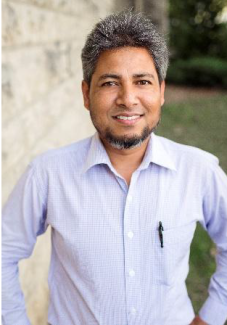The Board for International Food and Agricultural Development (BIFAD) has selected Mr. Mohammad Mokhlesur Rahman, a PhD candidate in genetics at Kansas State University, as the winner of the 2018 BIFAD Student Award for Scientific Excellence in a Feed the Future Innovation Lab. The award recognizes Mr. Rahman for his pivotal role in establishing Bangladesh’s largest wheat testing nursery, where over 1,800 candidate lines have been tested. This has helped identify promising heat-tolerant varieties for the country’s wheat farmers.
Mr. Rahman is currently a fellow with the Borlaug Higher Education for Agricultural Research and Development (BHEARD) Program, funded by the U.S. Agency for International Development (USAID) and administered by Michigan State University. He is completing his doctoral research in affiliation with the Feed the Future Innovation Lab for Applied Wheat Genomics at Kansas State University, also funded by USAID.
Mr. Rahman grew up in a farming community, spending many of his childhood days helping to cultivate rice, jute, wheat, vegetables, pulse, and oil crops on his family’s five acres of land. He attended Bangladesh Agricultural University, completing his B.Sc. Agriculture in 2004 and M.Sc. in Genetics and Plant Breeding in 2006. After graduation, he joined the Bangladesh Agricultural Research Institute (BARI) as a Scientific Officer in wheat breeding, and he contributed to the development and release of four improved wheat varieties in Bangladesh—BARI Gom 25, BARI Gom 26, BARI Gom 27, and BARI Gom 28. These are all high yielding with different types of biotic and abiotic stress tolerance/resistance. The BARI Go 26 and BARI Gom 27 are Ug-99 stem rust resistant wheat varieties and BARI Gom 28 is the highest yielder among the group. In 2014, Mr. Rahman received a BHEARD fellowship as part of efforts by USAID to build scientific research capacity at BARI.
Under the mentorship of Dr. Jesse Poland, Director of the Feed the Future Innovation Lab for Applied Wheat Genomics, Mr. Rahman was instrumental in helping the program expand wheat trial testing locations to his home country. Mr. Rahman has been responsible for establishing, implementing, and evaluating field trials for the new wheat testing nursery over the last four years. He has led implementation of electronic data capture and high-throughput phenotyping approaches that are modernizing breeding technologies in Bangladesh.
Mr Rahman’s experiences, opportunities, and networks gained through the BHEARD program and the Applied Wheat Genomics Innovation Lab have given him a solid foundation for a successful career of service to wheat farmers in Bangladesh and the global agricultural community.

